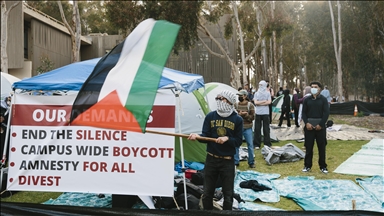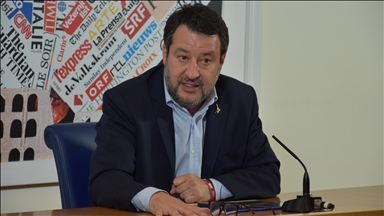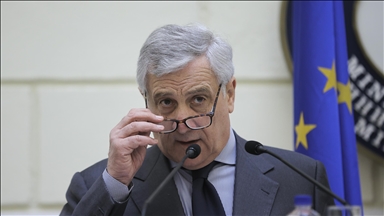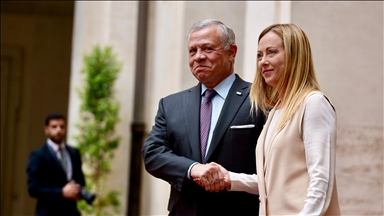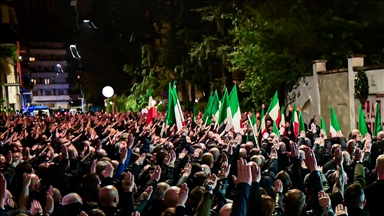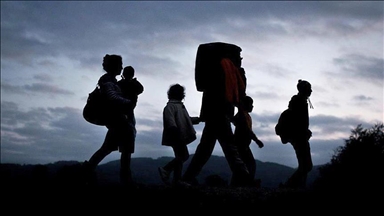‘Tired and very worried’: Lampedusa locals feel abandoned but keep helping migrants
Residents call for long-term solutions as Italian island remains frontline for massive migrant flows
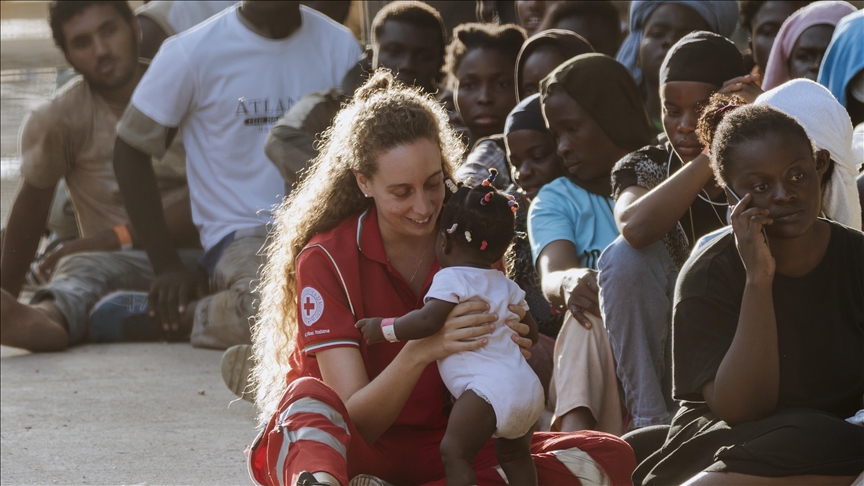 A member of the Red Cross entertains a migrant baby as migrants wait to be transferred at the hotspot in Lampedusa Island, Italy on September 17, 2023. ( Valeria Ferraro - Anadolu Agency )
A member of the Red Cross entertains a migrant baby as migrants wait to be transferred at the hotspot in Lampedusa Island, Italy on September 17, 2023. ( Valeria Ferraro - Anadolu Agency )
- Residents call for long-term solutions as Italian island remains frontline for massive migrant flows
- Officials ‘keep coming with usual promises but everything remains the same,’ resident tells Anadolu
- Lampedusa saw surge in migrant arrivals this month that doubled the island’s population of 6,000
LAMPEDUSA, Italy
Donato Sparma, 54, owns a small fruit stand in one of the tiny streets of Italy's southern Lampedusa island and has never hesitated to donate some to the hungry migrants who land there after perilous seacrossings.
Lampedusa, a strip of land measuring just 20 square kilometers (around 8 square miles), is closer to North Africa than to mainland Italy.
That is why in recent years it has become the frontline of Europe’s migration crisis, with its small reception center constantly overwhelmed and the island’s tourist economy struggling to coexist with the migrant flows.
The islanders – who were mostly ready to lend a hand to the thousands of migrants reaching Lampedusa with hopes for a better life in Europe – are now feeling abandoned.
“We are tired and very worried,” Sparma told Anadolu on a hot September day as the island was coping again with a new migration emergency and thousands of daily arrivals.
“We have always helped migrants. I often gave them some fruit and food, but the situation is difficult and we don’t see any change,” he added.
Lampedusa’s residents are not new to huge migratory flows from Libya and Tunisia, which intensified since the beginning of the Arab Spring.
But now they feel that both the Italian government and EU authorities are not providing any durable solution.
“They keep coming here with their usual promises,” Sparma said, recalling the recent visits by Premier Giorgia Meloni and her deputy Matteo Salvini, leader of the right-wing party the League and a staunch anti-migration proponent.
“But everything remains the same.”
Once again, in mid-September, the island – which has a population of just 6,000 – was overwhelmed by tens of thousands of migrants.
The interaction between migrants and locals has been mostly without trouble. But Lampedusa residents still remember the unexpected explosion of violence in September 2011, when migrants set mattresses on fire at the island’s crowded reception center to protest against forced repatriation.
Three buildings were destroyed and the protesters clashed with locals and police.
“I remember those days,” Sparma said, shaking his head. “We don’t want that to happen again.”
They don’t want to work
At the Panificio Luca, a local spot for good “panelle” and “arancini” – Sicilian chickpea fritters and rice balls – local workers are just as divided as Europe over the solutions needed to solve the migration issue.
An older worker, a middle-aged woman who declined to be named, said residents have always helped migrants during emergencies, but now a wider and more complex approach is needed.
The younger one, a girl in her 20s, had a stronger opinion on the people who leave North Africa for a new life in Europe.
“They end up getting some money from the government and then do nothing. They don’t want to work, that’s the truth,” she said.
Meloni’s far-right Brothers of Italy party won national elections last September largely on a promise to curb mass migration into Italy.
However, the number of arrivals on boats from North Africa has increased, with more than 130,000 migrants registered by the Interior Ministry so far this year, almost double of the same period in 2022.
Following the most recent Lampedusa crisis, Meloni called on the EU to do more to help relieve the pressure on Rome.
Brussels did agree to step up efforts and announced it would start releasing money to Tunisia as part of a pact to stem irregular migration from the country.
Salvini’s anti-immigration League party recently attacked the German government for funding an NGO carrying out rescues in the Mediterranean, calling it a “very serious interference” in Italian affairs.
Salvini, who closed Italian ports to migrant rescue ships when he was interior minister in 2019, has pushed for the repatriation of migrants ineligible for asylum, specifically by building new detention centers and extending the duration of detention.
Last week, the right-wing government published a decree saying that migrants awaiting an asylum decision would have to pay a deposit of about €5,000 ($5,250), or risk being sent to a detention center.
Anadolu Agency website contains only a portion of the news stories offered to subscribers in the AA News Broadcasting System (HAS), and in summarized form. Please contact us for subscription options.


